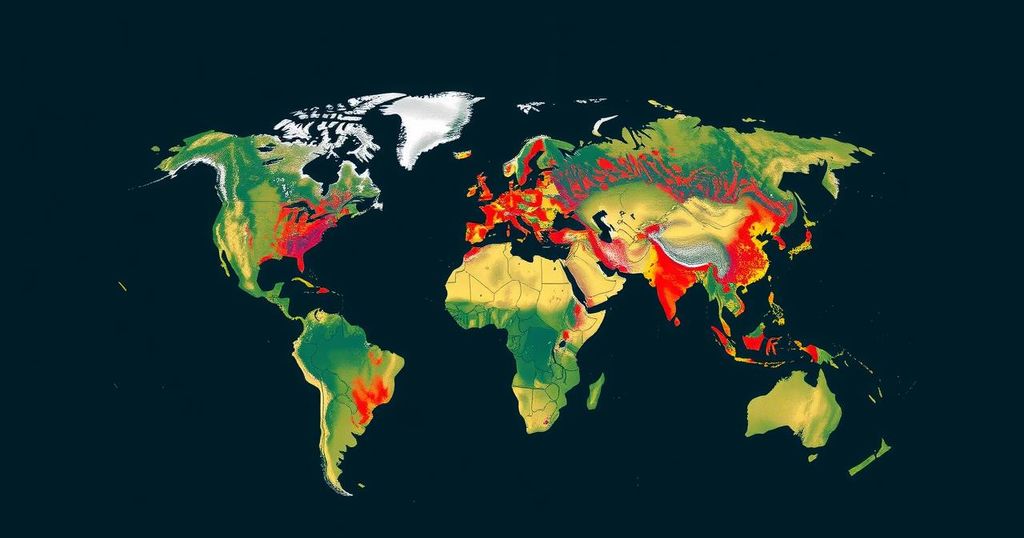Climate Change Emerges as a Record Threat to Global Health
A significant report indicates that climate change is leading to unprecedented health threats worldwide, with experts warning that inaction has dire consequences. Key findings include record levels of heat-related deaths, spread of infectious diseases, and increased food insecurity. The report calls for urgent action as global emissions continue to rise, despite some positive trends in air quality and renewable energy use.
A recent report has highlighted the alarming ways in which climate change is increasingly threatening human health. The report notes a record number of adverse health impacts linked to climate change, asserting that “wasted time has been paid in lives”. Released amidst unprecedented global heatwaves, wildfires, hurricanes, droughts, and floods, the findings coincide with intensifying discussions on climate action leading up to the upcoming COP29 talks in Azerbaijan. Compiled by a team of 122 experts, including specialists from the World Health Organization, the eighth Lancet Countdown on health and climate change presents a grim assessment. Of the 15 indicators monitored over the past eight years, it was found that 10 have reached alarming new heights. These indicators include the frequency of extreme weather events, rising mortality rates among the elderly due to heat exposure, the escalation of infectious diseases, and increases in food insecurity stemming from agricultural disruptions caused by droughts and floods. Marina Romanello, executive director of the Lancet Countdown, emphasized the urgency of the situation, declaring that the report reveals “record threats to the health and survival of people in every country, to levels we have never seen before.” The report notes that mortality rates among individuals over the age of 65 due to heat exposure have surged by 167 percent since the 1990s. Additionally, rising temperatures have expanded the habitat for mosquitoes, which has facilitated the spread of deadly diseases; dengue fever alone saw record high cases, exceeding five million globally in the previous year. Moreover, the report highlights the destruction of approximately five percent of the world’s tree cover between 2016 and 2022, diminishing the planet’s ability to assimilate carbon dioxide emissions. It also sheds light on the role of fossil fuel companies and certain governments in exacerbating climate change; global greenhouse gas emissions have continued to rise, with the World Meteorological Organization reporting an increase last year. Companies in the oil and gas sector have reportedly amplified fossil fuel production and governments have extended fossil fuel subsidies, which totaled $1.4 trillion in 2022—significantly overshadowing investments aimed at facilitating a transition towards a healthier future. Despite these challenges, Romanello notes some hopeful developments. Between 2016 and 2021, deaths attributed to air pollution from fossil fuels declined nearly seven percent, a notable achievement linked to efforts to curb coal-related pollution. Furthermore, the share of renewable energy sources used to generate electricity almost doubled, reaching 10.5 percent. Additionally, there is a growing acknowledgment of the health implications within climate negotiations, as evidenced by ongoing efforts at the COP talks and upcoming national climate plans. Romanello cautioned, however, that without immediate action, the future presents dire risks. “There is really no more time to waste—wasted time has been paid in lives,” she warned. She encouraged individuals to adopt climate-sensitive practices, including maintaining a sustainable diet, minimizing carbon emissions during travel, boycotting banks that invest in fossil fuels, and supporting political leaders committed to substantive climate action.
Climate change continues to escalate as a formidable threat to global health, with various extreme weather events linked to rising temperatures inducing adverse health outcomes. As countries face unprecedented environmental challenges, it is evident that the time for meaningful action is critical. This context underscores the findings of the recent Lancet Countdown report, which serves as a stark reminder of the health repercussions stemming from climate change. Given the approaching COP29 talks and the political landscape surrounding climate policy, the report emphasizes that immediate and tangible measures are essential to mitigate these health threats and promote resilience against climate impacts.
The findings of the Lancet Countdown report paint a concerning picture of the extensive health risks posed by climate change, revealing a pressing need for immediate action. While some progress has been noted, the stark increase in health threats associated with extreme weather events, rising infections, and food insecurity underscores the urgency of collective and decisive intervention. Stakeholders, including individuals, businesses, and governments, must prioritize climate action to ensure a healthier future for all.
Original Source: www.rfi.fr




Post Comment